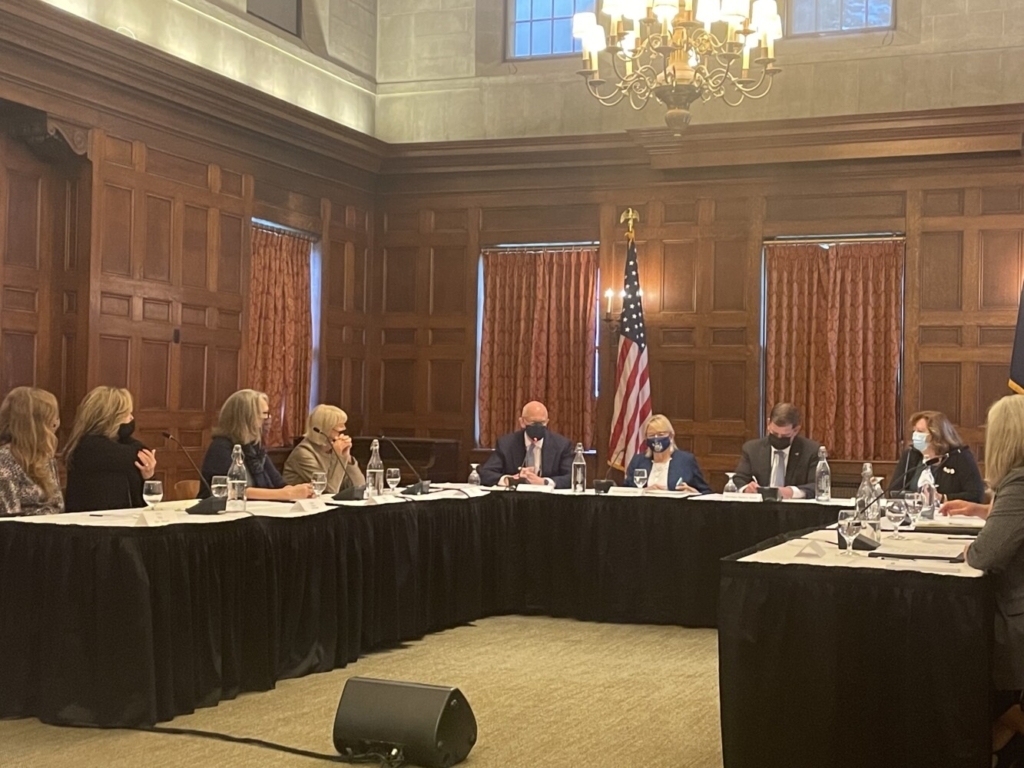U.S. Secretary of Labor Marty Walsh visits Bowdoin
October 15, 2021
 Courtesy of the Times Record
Courtesy of the Times RecordLast Tuesday, U.S. Secretary of Labor and former Mayor of Boston Marty Walsh visited campus for a roundtable conversation with Governor Janet Mills, College President Clayton Rose and a panel of regional business leaders at Moulton Union. The conversation focused on Maine’s WorkShare program, adopted by the state in 2011 to decrease layoffs and expanded during the pandemic. The panel unanimously lauded the great successes of the program at the state level and suggested ways it could be further implemented after the labor market fully stabilizes.
The event followed a busy day for Walsh, as he had met with workers, employers and other government officials across the state earlier that day. After a series of introductions by Rose, Walsh and Mills, the business leaders—including executives at L.L. Bean, Westbrook-based clothing supplier American Roots, marketers from Visit Portland, Maine Equal Justice and Darlings Auto Group—spent close to an hour elaborating on how helpful the program was in terms of allowing them to limit furloughs and layoffs.
WorkShare programs seek to reduce layoffs and furloughs for struggling businesses by allowing them to reduce workers’ hours by up to 50 percent and fully subsidizing their forgone wages. This allows a business to cut costs by reducing total labor hours without having to scale back its roster. Employees therefore get to keep their jobs and benefits like health insurance while receiving partial unemployment benefits. While only one to two businesses utilized the program before the pandemic, 246 have successfully applied for funding in the past year and a half, preventing 3,044 workers from being laid off according to the Maine Department of Labor (MDOL).
Maine is one of 26 states to offer a WorkShare-type program through its labor department. The MDOL received a $382,579 grant from the U.S. Department of Labor to promote the Workshare program this past April. The Department of Labor has recently come under increased scrutiny as a key remaining source of unemployment insurance after the expiration of increased federal benefits under the Federal Pandemic Unemployment Compensation program on Labor Day. Over the last 17 months of the pandemic, the MDOL paid over $2.4 billion in federal and state unemployment benefits.
Walsh emphasized the importance of pursuing labor and business interests together from his position.
“When President Biden called me and asked me to be his Secretary of Labor, he told me my job would be to strengthen American workers,” Walsh said. “But this is not labor versus business. This is labor and business. Commerce and labor, if you will.”
One of the aspects of the program was that it allowed participants predictability during the uncertainty of the pandemic.
“We’ve gone through many stages of the pandemic, and it’s ever-changing,” said Ryan Fecteau, speaker of the Maine House of Representatives who serves Maine House District 11 which is a part of Biddeford. “For workers, to have one thing—a paycheck—be predictable was just invaluable.”
Sarah Cox, the vice president of human resources- at L.L. Bean, said that safety concerns during the early stages of the pandemic left her company no choice but to reduce their operations.
“Pretty early on, we accepted that we were probably going to have to furlough employees,” Cox said. “We quickly established that our primary goals were keeping our employees safe and healthy, but also protecting jobs.”
After L.L. Bean successfully applied for a WorkShare grant, they were able to prevent furloughing close to 1,000 employees as well as closing multiple storefronts with the funding they received.
By the end of the panel, the consensus was clear—WorkShare has proved an invaluable tool for hundreds of businesses statewide.
“American Roots wouldn’t exist without the program,” owner Ben Waxman said.
To Mills, the majority of whose tenure has been encompassed by the pandemic, the positive effects of the WorkShare program holds promise for the future.
“Maine is on the path to economic recovery,” Mills said.

Comments
Before submitting a comment, please review our comment policy. Some key points from the policy: